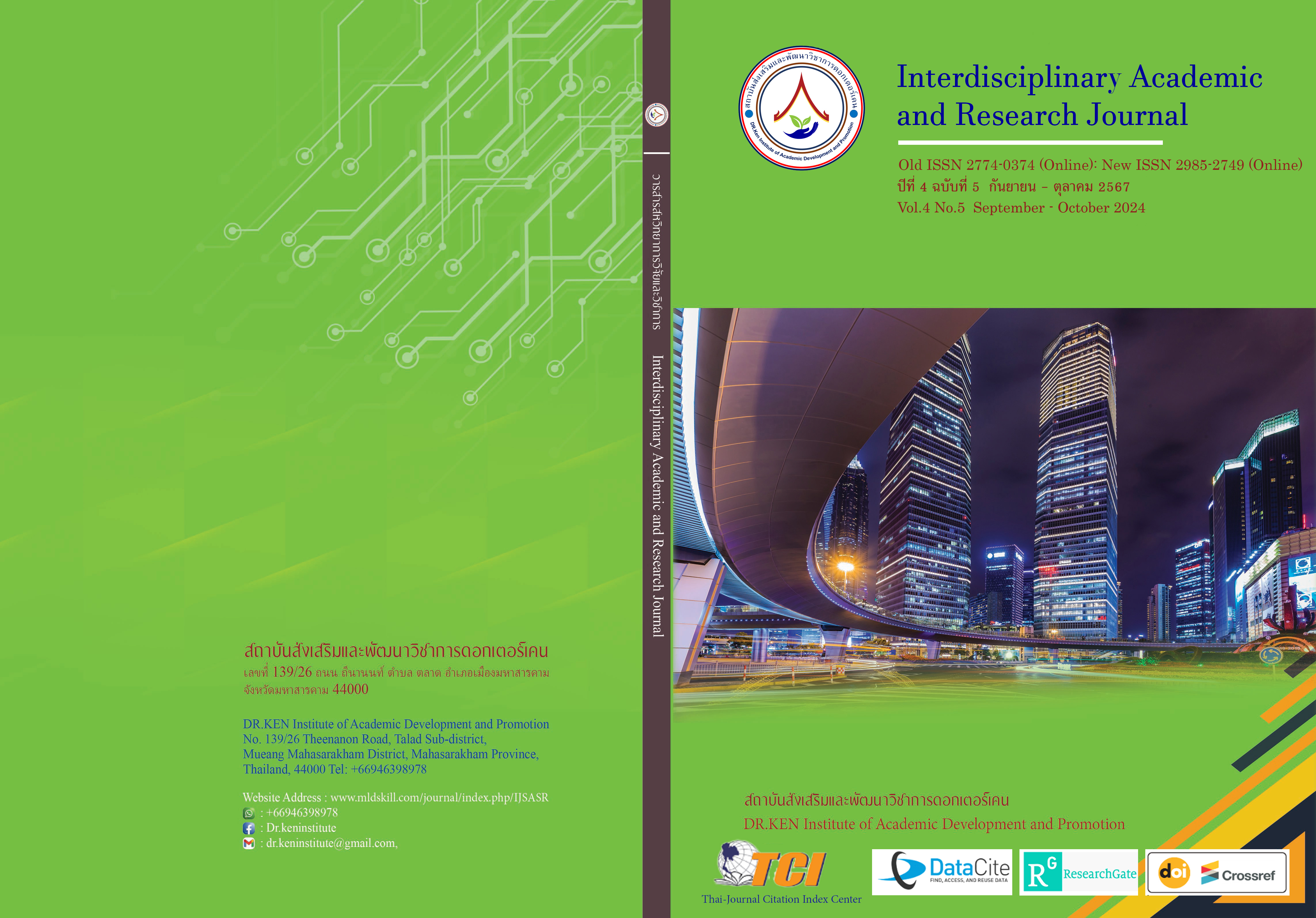The 21st Century Management Skills for Educational Institution Administrators under the Jurisdiction of the Ubon Ratchathani Secondary Educational Service Area Office, Amnat Charoen
DOI:
https://doi.org/10.60027/iarj.2024.276095Keywords:
21st Century Management Skills; , Educational institution administratorsAbstract
Background and Aims: Education is an important tool for human, social, and national development. It is the main mechanism for creating a quality workforce. Able to live happily with others in society. At a time when the world is changing rapidly in the 21st century, this research has the following objectives: 1) to study and analyze the management skills in the 21st century of Educational Institution Administrators under the Ubon Ratchathani and Amnat Charoen Secondary Educational Service Area Offices. 2) To compare the management skills in the 21st century among administrators of educational institutions under the same affiliation. Classified by position education level and the size of the educational institution. 3) To study and find ways to develop management skills in the 21st century of educational institution administrators in those areas.
Methodology: The sample used in this research consisted of 351 school administrators and teachers. The sample size was determined according to Krejci and Morgan's table. and used the random sampling method. The research instrument was a questionnaire with a 5-level rating scale. Which has a consistency index between 0.80 and 1.00 and the total reliability of the questionnaire is 0.89. Statistics used in data analysis include frequency, percentage, mean, standard deviation, T-value and F-value tests.
Results: The results of the research are as follows: (1) Management skills in the 21st century of administrators of educational institutions under the Secondary Educational Service Area Office, Ubon Ratchathani and Amnat Charoen, overall it is at a high level. (2) Results of comparing opinions about management skills in the 21st century among administrators of educational institutions under the same affiliation. Divided by position Education level and the size of the educational institution. It was found that overall and in each aspect there were no differences. (3) Guidelines for promoting management skills in the 21st century of school administrators in the Ubon Ratchathani Secondary Educational Service Area Office consist of 5 areas: 1) communication skills, 2) relationship-building skills, 3) technology and digital skills, 4) vision setting skills, and 5) analytical thinking and creative thinking skills.
Conclusion: According to the research, educational institution administrators in the twenty-first century working for the Secondary Educational Service Area Office of Ubon Ratchathani and Amnat Charoen have generally high management skills. There were no significant differences in management skills across positions, educational levels, or institution size. To improve these abilities, the study suggests focusing on five key areas: communication, relationship building, technology and digital skills, vision setting, and analytical and creative thinking.
References
กณิษฐา ทองสมุทร. (2561). ทักษะการบริหารงานในศตวรรษที่ 21 ของผู้บริหารสถานศึกษาตามการรับรู้ของครู สังกัดสำนักงานเขตพื้นที่การศึกษาประถมศึกษาสุราษฎร์ธานี เขต 2. วิทยานิพนธ์ปริญญามหาบัณฑิต. บัณฑิตวิทยาลัย: มหาวิทยาลัยราชภัฏสุราษฎร์ธานี.
กนกวรรณ มุขตา และรุจิราพรรณคงช่วย. (2565). ทักษะการบริหารในศตวรรษที่21 ของผู้บริหารสถานศึกษาสังกัดสำนักงานเขตพื้นที่การศึกษาประถมศึกษาพัทลุงเขต 1. วารสาร มจร อุบลปริทรรศน์, 7(2), 144-156.
ไกรศร เจียมทอง. (2561). ทักษะของผู้บริหารสถานศึกษาในศตวรรษที่ 21 สังกัดสำนักงานเขตพื้นที่การศึกษามัธยมศึกษาเขต 32. วิทยานิพนธ์ปริญญามหาบัณฑิต. บัณฑิตวิทยาลัย: มหาวิทยาลัยราชภัฏมหาสารคาม.
จินตนา ศรีจำปา. (2566). ทัักษะของผู้้บริิหาริสถานศึึกษาในศตวรรษที่ 21 ที่ส่งผลต่อการบริิหารงานวิชาการในสถานศึึกษา สังกัดสำนักงานเขตพื้นที่การศึึกษาประถมศึึกษากาญจนบุรี เขต1. วารสารบัณฑิตศึกษามหาจุฬาขอนแก่น, 10(4), 127-128.
บุญชม ศรีสะอาด. (2545). การวิจัยเบื้องต้น. พิมพ์ครั้งที่ 7. กรุงเทพฯ: สุวีริยาสาส์น.
บุญชม ศรีสะอาด. (2553). การวิจัยเบื้องต้น. พิมพ์ครั้งที่ 8. กรุงเทพฯ : สุวีริยาสาส์น.
บุญส่ง กรุงชาลี .(2561). ทักษะการบริหารในศตวรรษที่ 21 ของผู้บริหารสถานศึกษาขึ้นพื้นฐาน สังกัดสำนักงานเขตพื้นที่การศึกษาประถมศึกษาสุรินทร์ เขต 3. วิทยานิพนธ์ครุศาสตรมหาบัณฑิต. บัณฑิตวิทยาลัย: มหาวิทยาลัยราชภัฏบุรีรัมย์.
พงษ์พันธ์ อัศพันธ์ และวานิชประเสริฐพร. (2566). ทักษะการบริหารในศตวรรษที่ 21ของผู้บริหารสถานศึกษา สังกัดสำนักงานเขตพื้นที่การศึกษาประถมศึกษาขอนแก่น เขต 4. วารสาร มจร อุบลปริทรรศน์, 8(2), 1651-1664.
มณฑาทิพย์ นามนุ. (2561). ทักษะของผู้บริหารสถานศึกษาในศตวรรษที่ 21 สังกัดสํานักงานเขตพื้นที่8 การศึกษาประถมศึกษาปทุมธานีเขต 2. วิทยานิพนธ์ศึกษาศาสตรมหาบัณฑิต สาขาวิชาการบริหารการศึกษา มหาวิทยาลัยเทคโนโลยีราชมงคลธัญบุรี.
สำนักงานเลขาธิการสภาการศึกษา. (2560). แผนการศึกษาแห่งชาติ พ.ศ. 2560-2579. กรุงเทพฯ: พริกหวานกราฟฟิค.
สุวัฒน์ กู้เกียรติกาญจน์ และวิชิต แสงสว่าง. (2564). ทักษะการบริหารในศตวรรษที่ 21 ของผู้บริหารสถานศึกษา สังกัดอาชีวศึกษาจังหวัดฉะเชิงเทรา. วารสาร มจร สังคมศาสตร์ปริทรรศน์, 10(3), 68-80.
อติกาญจน์ ศรีสังข์. (2564). ทักษะการบริหารงานในศตวรรษที่ 21 ของผู้บริหารสถานศึกษาตามความคิดเห็นของครูผู้สอน สังกัดสำนักงานเขตพื้นที่การศึกษาประถมศึกษาจันทบุรี. วิทยานิพนธ์ครุศาสตร มหาบัณฑิต สาขาการบริหารการศึกษา มหาวิทยาลัยราชภัฏรำไพพรรณี.
Hoyle, English & Steffy. (2005). Skills for Successful 21st Century School Leadership. February 25, 2014, Library of Congress Catalog Card No.97-78468. Retrieved from: http://www.rowmaneducation.com.
Sergiovanni, T. J. (1994). Organizations or communities? Changing the metaphor changes the theory. Educational Administration Quarterly, 30, 214-226. doi:10.1177/0013161X94030002007
Downloads
Published
How to Cite
Issue
Section
License
Copyright (c) 2024 Interdisciplinary Academic and Research Journal

This work is licensed under a Creative Commons Attribution-NonCommercial-NoDerivatives 4.0 International License.
Copyright on any article in the Interdisciplinary Academic and Research Journal is retained by the author(s) under the under the Creative Commons Attribution-NonCommercial-NoDerivatives 4.0 International License. Permission to use text, content, images, etc. of publication. Any user to read, download, copy, distribute, print, search, or link to the full texts of articles, crawl them for indexing, pass them as data to software, or use them for any other lawful purpose. But do not use it for commercial use or with the intent to benefit any business.
















.png)


